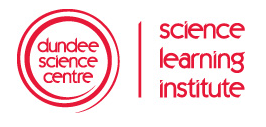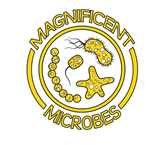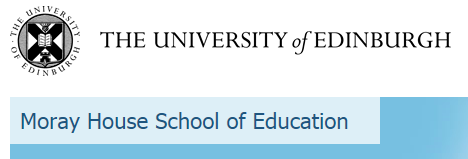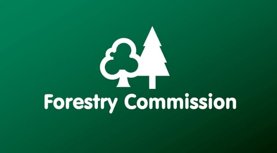
 What is the Magnificent Microbes project?
What is the Magnificent Microbes project?
The Magnificent Microbes project is a joint venture between the College of Life Sciences at the University of Dundee and Dundee Science Centre Science Learning Institute. The project, run in 2010 and 2012, has been received very positively by children and teachers alike, being described as “exciting”, “inspiring”, “a great way to understand more about microbes”. Teachers described the impact on children’s learning, and enthusiasm for science as a result of taking part. Participation provided teachers with opportunities for professional learning which had built capacity and improved their knowledge, understanding and confidence in learning around the Body Systems and Cells organiser within Curriculum for Excellence.
The project includes:
– pre-visit activity (supporting literacy)
– visit to Dundee Science Centre to participate in Magnificent Microbes day (themes: hands-on science, positive role models, cutting-edge research on the doorstep)
– post-visit learning (supporting, literacy, numeracy and encouraging creativity)
– post-visit opportunities to have scientists visiting the school
– Celebration Day (sharing learning, supporting literacy)
– display of children’s learning about Magnificent Microbes in the Prism at Dundee Science Centre in May / June 2014
Where does the Magnificent Microbes project fit within Curriculum for Excellence?
“At second level (SCN 2-13a), through practical activities carried out in a safe environment, learners can explore examples of microorganisms that are beneficial and harmful e.g. the use of yeast in bread making and the importance of bacteria and fungus in the breakdown of waste in compost columns. This can be further developed… to include practical activities to safely test for the presence of microorganisms in the local environment. The effects on growth of microorganisms of a variety of factors, such as temperature and disinfectants, can also be investigated. This leads on to the exploration of the use of microorganisms and enzymes in industry at fourth level.”
Education Scotland (2009) Concept development in the sciences paper
“Through research and discussion I have an appreciation of the contribution that individuals are making to scientific discovery and invention, and the impact this has made on society”
Education Scotland (2009) Curriculum for excellence: sciences experiences and outcomes
Participation in the Magnificent Microbes project supports development of the capacities of Curriculum for Excellence:
Successful learners
Attributes: enthusiasm and motivation for learning; openness to new thinking and ideas
Capabilities: use literacy, numeracy and communication skills; think creatively and independently
Responsible citizens
Attributes: respect for others
Capabilities: develop knowledge and understanding of the world and Scotland’s place in it; evaluate environmental scientific and technological issues
Effective contributors
Attributes: resilience
Capabilities: communicate in different ways and in different settings; work in partnerships and teams; create and develop.
Involvement in the project includes starter activities for use with learners, prior to the class to Dundee Science Centre. The project will be completed in the classroom following the Magnificent Microbes day in March 2014. These activities have been designed to be used flexibly, to ensure that they can be used to meet the needs of children in their own context, and to develop skills in literacy and numeracy appropriate to second level.
Literacy across learning
Participation in the project provides opportunities for learners to developing literacy skills through:
- explaining their thinking to others (Listening and talking for learning, Literacy across learning: principles and practice);
- finding, selecting, sorting, summarising and linking information from a variety of sources (Reading for learning, Literacy across learning: principles and practice);
- making notes, developing ideas and acknowledging sources within written work, and developing and using effective vocabulary (Writing for learning, Literacy across learning: principles and practice).
Creativity in Sciences
After the visit
Within the class, we would like the children to create a piece which represents and communicates their learning. Scientists from the University of Dundee would be delighted to come to each school to talk about this with the children. This provides the opportunity for learners to share their thinking and use others’ contributions to build on thinking.
From each participating class we would invite the children who created the work(s) to join us, with their teacher(s) and their families, at a Magnificent Microbes Learning Celebration at the College of Life Sciences, University of Dundee.
Numeracy in sciences
“Having discussed the variety of ways and range of media used to present data, I can interpret and draw conclusions from the information displayed, recognising that the presentation may be misleading.
I have carried out investigations and surveys, devising and using a variety of methods to gather information and have worked with others to collate, organise and communicate the results in an appropriate way.”
Education Scotland (2007) Curriculum for excellence: numeracy and mathematics experiences and outcomes
At second level learners have an extended range of presentation methods, including bar and line graphs, from which they can select the most appropriate for presenting the data/information they have collected. They identify the relationship between the variables and use this to draw an appropriate conclusion, consistent with the findings.
Education Scotland (2013) Assessing Progress and Achievement in the Broad General Education in Sciences
After the visit
Within ten days of the visit, we will send a photograph for each child of the microbe growth from their hands. We would ask the children to carry out a class survey and select the most appropriate method for presenting their data / information from which they can consider whether or not it is possible to draw any conclusions about gender differences in microbe growth. This activity provides opportunities to develop numeracy through appropriate interpretation of numerical information, using it to draw conclusions and make reasoned evaluations.
Celebrating learning
At the Magnificent Microbes Learning Celebration at the University of Dundee, the team from Dundee Science Centre and the scientists and researchers involved with the project will be joined by children from all of the classes participating in the project. We will use the children’s work to create a display about their learning. At this celebration, the children will have the opportunity to explain to the scientists at the University of Dundee what their work shows, why they have chosen to do the work as they have done, and why they chose that particular aspect of the learning. Through this, they will have the opportunity to organise their ideas in an appropriate way for the purpose, using suitable vocabulary for their audience.
Sharing their work with a wider audience
Following the Celebration Day, we will use the display created as an exhibit in the Prism of Dundee Science Centre, for families, visitors and other school groups to see. The children’s microbe sample images, along with samples from members of the public will also be included as part of the display. We hope this display will help others learn about Magnificent Microbes and be inspired to learn more!
What does participation involve?
| 4 February 2014 |
Project familiarisation: meet the team and find out more about the hands-on activities in the project |
| 14 March 2014 |
Schools visit Dundee Science Centre |
| 21 March 2014 |
Schools receive microbe handprints from University of Dundee |
| 21- 25 April 2014 |
Researchers from University of Dundee visit schools (optional) |
| 25 April 2014 |
Schools to return data presentations on microbe growth to University of Dundee |
| 25 April 2014 |
Children to select who to represent their class at the Learning Celebration |
| 6 May 2014 |
Learning Celebration at University of Dundee |
| 9 May 2014 |
Deadline for return of teacher evaluations |
How many children, classes and schools can be involved?
We have capacity to include 180 – 210 children in the project. The participation cost of the project per child is £50. Of this cost, the University of Dundee and Dundee Science Centre have sought funding to cover more than 90%. The participation cost is therefore £3.50 per child. For children attending schools in Dundee City Council, funding is available to support this participation cost.
Where Scottish Government funding is available to support travel, we will provide a travel subsidy to cover the full cost of transport. This is determined by criteria set by the Scottish Government.
Interested? Get in touch learning@dundeesciencecentre.org.uk
 Scotland’s Environment Web is running an exciting competition for young people, with fantastic prizes, and the closing date has been extended until 31st march 2014.
Scotland’s Environment Web is running an exciting competition for young people, with fantastic prizes, and the closing date has been extended until 31st march 2014.












